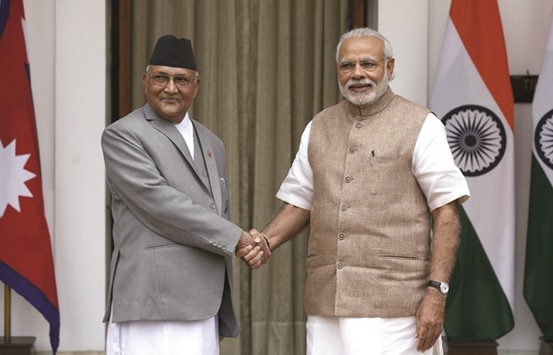The leaders of Nepal and India have overcome mutual misgivings, India’s foreign secretary said yesterday, after talks to ease tensions over Nepal’s recently-adopted constitution.
Prime Minister K P Oli visited New Delhi for talks with his Indian counterpart Narendra Modi after a months-long freeze in relations triggered by the grievances of plains dwellers in southern Nepal who have close historical ties to India.
Nepal, which moved from absolute to constitutional monarchy in 1990, made changes to its constitution to ensure greater participation of the Madhesi community in parliament.
But community leaders said the amendments failed to address their central fear that provincial borders would be redrawn in a way that would divide them.
“Our prime minister appreciated the progress made towards consolidation of constitutional democracy in Nepal,” Indian Foreign Secretary Subrahmanyan Jaishankar told a news
briefing.
A four-month border blockade by the Madhesis ended only after amendments to the constitution that sought to address their concerns about representation. India welcomed the amendments, paving the way for Oli’s visit.
“After decades of struggle, the framing and promulgation of Nepal’s constitution is an important achievement,” Modi told reporters after meeting Oli, adding its success would depend on consensus and dialogue.
Modi and Oli inaugurated a power transmission line between India and Nepal and signed a framework agreement for reconstruction work in areas affected by last year’s earthquakes that killed nearly 9,000 people.
Emphasising that peace, stability and prosperity in India’s neighbour Nepal was in the overall interest of both the nations, Prime Minister Narendra Modi said “Nepal’s stability
is linked to India’s security”.
“The whole India and I are in favour of economic development of Nepal ... I am confident that under your able leadership, India-Nepal relations will further strengthen and attain new heights,” Modi told Nepal Prime Minister K P Sharma Oli while addressing a joint press
conference with him.
“It is clear that the stability of Nepal is linked to India’s security. Prime Minister Oli and I agree that we need to face together the rising extremism and terrorism in the two countries,” Modi said.
Disclosing that security agencies of India and Nepal will strengthen co-operation to deal with threats of terrorism and extremism, the prime minister vowed that open borders of the two nations will not be allowed to be misused by terrorists and criminals.
“We will not allow terrorists and criminals to misuse the open borders between the two
countries.
“Security agencies of both countries will collaborate closely in this context,” Modi said.
India had offered $1bn in aid to Nepal, but reconstruction efforts have been slow to get started due in part to political turmoil and food and fuel shortages in the isolated state.

Nepal’s Prime Minister Khadga Prasad Sharma Oli, left, shaking hands with his Indian counterpart Narendra Modi during a photo opportunity ahead of their meeting at Hyderabad House in New Delhi yesterday.
